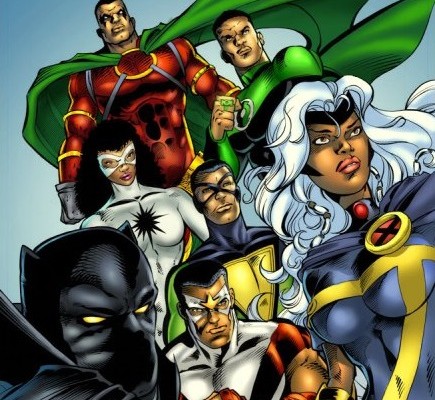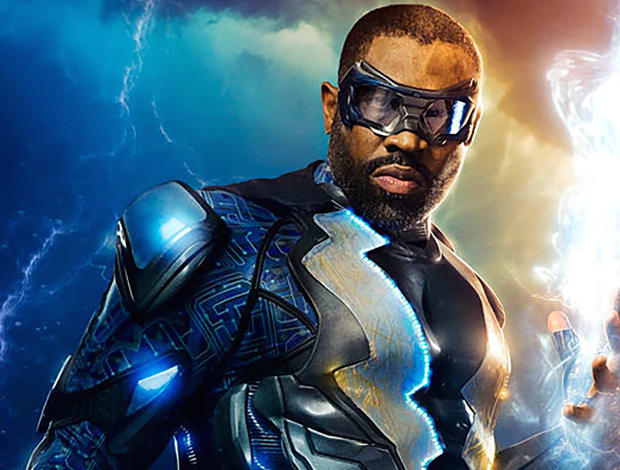The images you see as a child can shape what you become as an adult. All things considered, you may have noticed that lately black superheroes have stepped into the forefront of television and cinema.
Notably, Black Lightning is The CW’s highest rated premier in the last two years. Depicting a black man who’s home life, work life and heroic activity is intertwined. Thus, providing viewers insight into his heritage as well as the state of the black union.
Co-creator, Mara Brock Akil says, Lightning was made “Black on purpose.” In addition, she says:
“In the times we are in, I hope we are asking ourselves, ‘What am I going to do to make change for the better?’ I hope this show resonates in that way.”
For this reason, Lightning is portrayed as a man of great moral character. He is educated and dedicated to his family. Providing him with all the qualities to lead his people. At times Lightning places higher value on his community (Freeland), than is own family.
The series hits home for leading actor, Cress Williams:
“It’s not just beating people to hell,” Williams says. “It’s education. It’s, ‘How do you pull up a nation?’ It’s all these things that he’s trying to conquer, not on high, but in the midst of the community.”
Pulling at the consciousness of black viewers, making them question what they can do to uplift their own communities.
Other black superheroes such as Luke Cage live in ultra-realities where he too enjoys the sounds of Kendrick Lamar and people of the community frequent black owned barbershops. His ethnicity is directly related to impact of the storyline and his overall character. Luke Cage is as Hip-Hop as the breakbeat, as he made his comic book debut during the summer of 1972 in the classic Luke Cage, Hero for Hire #1 (by Archie Goodwin and John Romita Sr.). It was historic read for African American kids at the time and as revolution then as it the series was on Netflix, just last year. Cage was the first Black superhero to be featured as the protagonist and title character of a comic book. Straight talk… He was/ is bad ass and that’s probably the reason former Source Magazine writer, Cheo Hodari Coker pushed to make it one of the most popping series that Netflix has aired to date.
Like Brock Akil’s Lightining, Cage too is Black on purpose.
Marvel is on a role as they understand the thirst for Black greatness is at an all time high. On Freeform, the network that showcases Yara Shahidi‘s Grown-ish, Cloak and Dagger will make room for an African-American teen hero. Not since Dwayne McDuffie‘s Static Shock has a young Black boy hero shook up the comic book world and the amazing Aubrey Joseph takes the role of Tyrone Johnson aka Cloak to that next level.
Perhaps the greatest symbolism of the Black superhero is Marvel’s Black Panther. This character is the father of them all and the imagery that he possesses holds more weight than any in book, on the television, on a video game or in film. Why? Not because of the film (though the film seems to be of better quality than most made- with a cast as dynamic as it comes). But because the Black Panther is the first superhero of African descent in mainstream American comics, having debuted years before Falcon (1969), Luke Cage (1972), John Stewart aka Green Lantern (1971) or Storm (1975). When he made his debut in 1966 in the thick of the Civil Rights era, Black America needed a hero to unapologetically be strong. He was created as a king and the live action of the film makes him even appear even more stronger. In the film, we will get to witness a man of great wealth and power, restore order to his homeland (Wakanda). And if you look at all the trailers, it is clear that being “Black on purpose” seems to be the theme of this entire movie. Featuring the who’s who in Black Hollywood- Chad, Angela, Michael B., Lupita and Danai– how can this epic lose? It won’t. Pre-sale tickets for the film sold out within 24 hours– easily outpacing Captain America: Cold War.
Black superheroes are significant because they can spark the imagination of a black child: Giving them something positive to emulate. Seeing someone who looks like them, uplifting their fictional community can inspire that child to uplift their real community.
Imagery is almost more powerful than words. You don’t need a cape or powers to be a hero. Former President Barack Obama will always be a hero to his people. Not because of his policies, but because he showed them becoming president of the United States is possible. One picture which embodies this sentiment is a photo in which President Obama leans over so that a young black boy may feel his hair. As if to say: “Yes, I have hair like yours.” The boy’s face lights up with pure joy. At least now, if an elder says he can be president of the United States, he can believe it.



